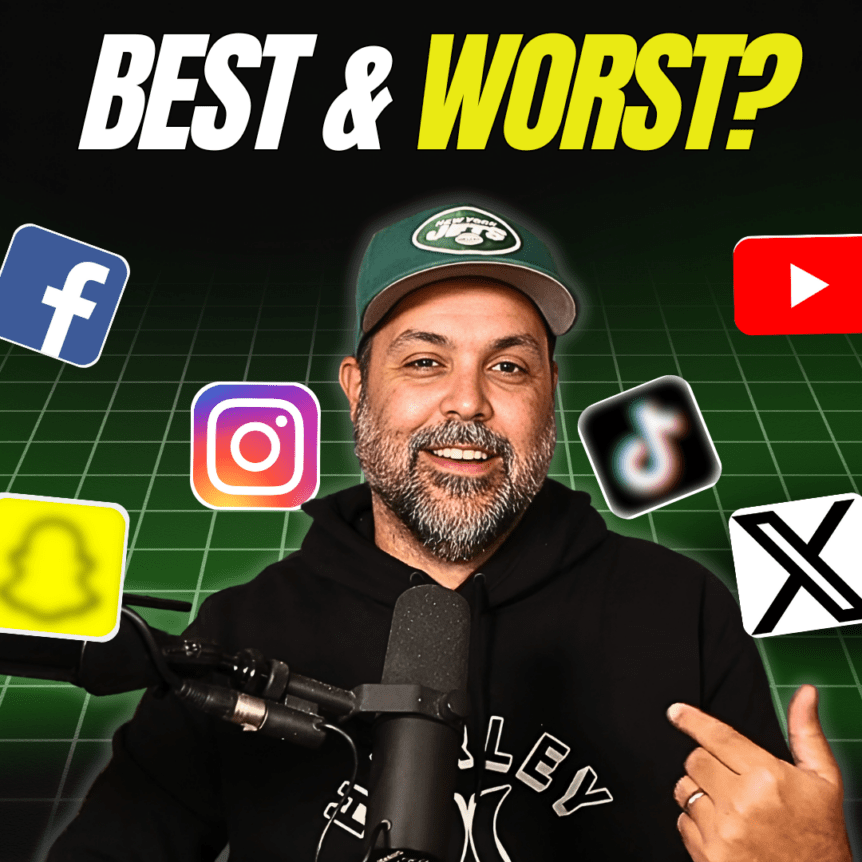Social media is a powerful tool for churches to connect with their communities, share messages of faith, and reach new people. With so many social media platforms available, it can be hard to know which ones are the best for ministry.
Some social media sites work well for live streaming services, while others are better for sharing daily inspiration or engaging in discussions. Choosing the right platform depends on your church’s goals and the audience you want to reach.
In this podcast, we rank the top social media sites for churches based on their features, ease of use, and effectiveness in spreading the Gospel. Whether your church is looking to grow its online presence, connect with members, or attract newcomers, finding the right social media platform can make a big difference.
Keep listening to discover which social media sites are the best for churches and how they can support your ministry!
Estimated reading time: 7 minutes
Table of contents
Social Media Platforms Ranking System

Choosing the right social media platforms is important for churches that want to connect with people effectively. A strong social media strategy helps churches reach their audience, share messages of faith, and build an online community.
With so many various social media platforms available, it’s important to focus on the ones that best fit your church’s needs. Some platforms are great for live streaming services, while others work better for sharing daily devotionals or engaging in conversations.
By following social media trends, churches can stay relevant and reach more people. Posting the right type of social media post on the right platform makes a big difference in engagement. Having clear church social media strategies helps ensure that each post serves a purpose, whether it’s inviting people to an event, sharing a sermon, or encouraging discussions.
Using the right platforms wisely can strengthen a church’s online presence and ministry impact.
Best, Useful, Limited
This ranking system helps churches quickly see which social media platforms work best for ministry. It uses three simple categories:
- Best for Churches
- Useful but Imperfect
- Limited Use
This makes it easy for social media teams to choose the right platforms without confusion. The rankings consider things like ease of use, audience engagement, and how many posts a church can share effectively.
Some platforms allow frequent updates, while others work better for occasional content. By using this system, churches can focus on the best tools for reaching people, growing their ministry, and making the most of social media.
Top 11 Social Media Platforms

Now it’s time to jump into our list of the top 11 social media platforms. Each of these vary from how impactful they can be for a church’s social presence. We’ll go through each platform, describe its strengths and weaknesses, and then rank it using our system.
Let’s jump in.
1. Facebook
Facebook is one of the best social media platforms for churches. It allows churches to share sermons, post updates, and engage with members easily. Features like live streaming, groups, and event pages help build community.
Churches can also promote fundraising events to support their ministries. With a large audience and easy-to-use tools, Facebook is a great choice for outreach and connection.
2. Instagram
Instagram is great for churches that want to share visuals like sermon clips, quotes, and behind-the-scenes moments. It encourages user-generated content, letting members share their faith experiences. Stories and Reels help reach new people, especially younger audiences.
However, it lacks strong group features and easy link sharing. While it’s good for engagement, it works best alongside other platforms.
3. Snapchat
Snapchat is mainly used by younger audiences, making it a possible tool for youth-focused online ministry. Churches can share short, engaging messages, behind-the-scenes clips, and event reminders. However, content disappears quickly, and it lacks group or community-building features.
It’s not ideal for long-term engagement or deep discussions. Because of these limitations, Snapchat is not ideal for most churches but may work for youth outreach.
4. Tiktok
TikTok is great for churches wanting to reach younger audiences with short, engaging videos. A few examples of content include sermon clips, worship moments, and Bible challenges.It’s ideal for spreading messages quickly and creatively. However, it lacks strong community-building tools and long-form content options. While it’s useful for outreach, it works best alongside other platforms.
5. YouTube
YouTube is a powerful platform for churches to share full-length sermons, worship services, and Bible studies. Church leaders can use it for deep teachings and community outreach. It’s great for long-form content and has a large audience reach.
However, it can be time-consuming to maintain a channel and requires good video production quality. While YouTube is excellent for visibility and content sharing, it may not be as interactive as other platforms.
6. Twitter/X

Twitter/X is useful for quick updates and sharing thoughts in real-time. Churches can use it to post scripture, reminders about church events, or inspirational messages. Its fast-paced nature allows for engagement through replies and retweets.
On the other hand, the platform’s character limit makes it harder to share detailed content, and it’s not ideal for building community. Despite this, it can help churches stay connected with their followers and stay visible.
7. LinkedIn
LinkedIn is great for connecting with professionals and building a network of senior leadership within the church community. It’s ideal for sharing church accomplishments, mission work, and leadership insights.
Churches can use it to connect with other organizations and professionals in the faith community. However, it’s not the best platform for engaging with members or sharing content like sermons.
8. Pinterest
Pinterest is great for sharing creative ideas like Bible study resources, church decorations, and kids ministry activities. Churches can create boards with inspirational quotes, sermon graphics, and event ideas. It’s visually appealing and allows for easy discovery of faith-based content.
However, it’s less interactive than other platforms and doesn’t foster direct community engagement. While useful for sharing resources and ideas, Pinterest is limited for churches when it comes to building deeper connections.
9. Reddit
Reddit can be a great platform for churches to engage in faith-based discussions and share resources. With its many niche communities, churches can join relevant subreddits to connect with people interested in spirituality.
It allows for in-depth conversations and can be a place to answer questions about faith. The downside is that it lacks personal connections and community-building tools, making it harder to engage with church members directly.
10. Spotify
Spotify is excellent for sharing worship music, sermon podcasts, and devotional playlists. Churches can create playlists that inspire and engage their audience, making it easy for listeners to connect through music. It’s great for reaching people who enjoy audio content. The downside is that it lacks features for direct interaction or community engagement.
11. BeReal
BeReal encourages authenticity by sharing real, unfiltered moments, making it a good choice for churches wanting to connect on a personal level. Churches can share behind-the-scenes moments, community activities, or spontaneous worship times, offering a more genuine view of church life.
The platform’s limited features, such as short posts and lack of community tools, make it harder to engage with followers deeply.
Choosing the Right Platform for You

Choosing the right social media platform for your church is essential to effectively reach and engage your community. Each platform offers unique strengths and limitations, and understanding these can help you make the best choice for your ministry.
Whether you’re sharing sermons on YouTube, connecting with younger audiences on TikTok, or building a community on Facebook, the right tools can amplify your church’s message and impact. Remember, it’s not about using every platform, but about focusing on those that align with your goals, whether it’s increasing engagement, promoting church events, or fostering a deeper connection with your members.
By leveraging the right social media strategy, your church can strengthen its outreach, grow its ministry, and stay connected with both current and potential members.
More Resources on Church Social Media





